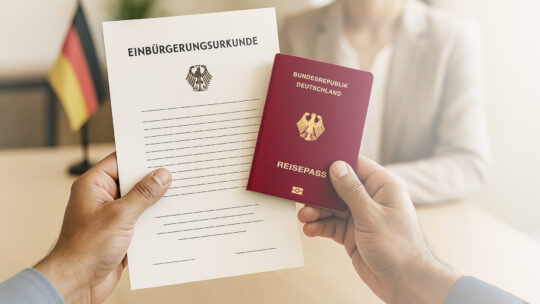The following tips are intended to ensure that you avoid mistakes as a foreign student. This will allow you to concentrate fully on your studies and prevent problems with the German authorities.
What are the most common mistakes in connection with migration laws (Residence Act)?
If you are not an EU citizen and are studying in Germany as a foreign student, you need to be aware of the following mistakes in order to avoid problems with the German immigration authorities in the medium and long term. Mistakes usually lead to you having to spend a lot of time and money in order to live (permanently) legally in Germany. Losing your right of residence can even mean that you are not allowed to finish your studies and have to leave the country.
Mistake 1: Don't break off your studies too quickly
Unfortunately, many students drop out of their studies without first ensuring that they still have a right of residence in Germany. If it turns out during your studies that you will not be able to complete your studies, you should check in advance whether you have a chance of obtaining another right of residence without your current studies. This depends on many criteria. Which right of residence comes into question depends on what you plan to do after dropping out of your studies. We therefore recommend that you discuss this issue in advance with Foreigners' office or an experienced lawyer. It is almost always possible to find a sensible solution under residence law. For this reason, it is always important to clarify which options are possible for you before you plan to discontinue your studies.
Mistake 2: You do not extend your right of residence in time
Temporary residence permits always have a specific expiration date. It happens again and again that students forget to extend their right of residence. If the right of residence is not extended in time, various problems may arise. In some cases, immigration authorities refuse to extend the residence permit after it has expired. Even if this is not legal, you should avoid this problem from the outset. Make a note of the expiration date of your residence permit and apply for an extension at least 2-4 weeks before it expires.
Mistake 3: You do not change your right of residence after graduation
After you have completed your studies and have been exmatriculated, you should change your right of residence as soon as possible. The later you change your right of residence, the longer it will take before you receive permanent residence rights or German citizenship.
Mistake 4: You work in a non-subject area after your studies
If you have completed your studies and would like to live in Germany, you will usually get a job soon. You will always have problems under residence law if you work in a job that does not correspond to your degree.
As a rule, this problem can be solved by adjusting the job title in the employment contract or by referring to the degree. In any case, you should make sure that the job description is worded correctly when signing the employment contract. Otherwise you will not receive a residence permit and, in the worst case, will have to leave the country. Adjusting the job description is therefore very important for you.
If you start a job that has nothing to do with your degree course, you will not be granted a right of residence. For example, if you have a degree in law and then work as a cab driver, you will not be granted a right of residence as a skilled worker.
Mistake 5: You have a criminal record
Previous convictions in Germany repeatedly lead to extensive problems with residence law. If you have a criminal record, this can lead to the following disadvantages:
- Your temporary right of residence will not be extended.
- They do not receive a permanent right of residence.
- You cannot apply for naturalization.
- They are deported.
Of course, problems do not arise with every conviction. However, you will have problems in the event of a conviction:
- more than 90 daily fines or
- to a suspended sentence of more than 3 months or
- to a prison sentence without parole
If you ever get into trouble with the public prosecutor's office, make sure that you stay below the above-mentioned limit rates in the event of a conviction. Of course, this is not possible for every offense. But even minor offenses can quickly lead to substantial penalties. If you instruct a lawyer, let them know the limits under residence law. Even lawyers specializing in criminal law are not always familiar with German residence law.

How can I live in Germany forever?
Many students initially only come to Germany to study and want to leave Germany again after successfully completing their studies. The reality is different after years in Germany. You have come to know Germany as an attractive country for your future. You may have found a partner or even started a family. The original plan to leave Germany has changed. We recommend that all foreign students look into how to obtain permanent residence rights or even German citizenship in Germany as soon as they enter the country.
As a foreign student, how do I obtain a permanent right of residence as quickly as possible?
You should plan how to obtain a permanent right of residence as quickly as possible when you enter the country. Many students do not have this issue in mind as they want to leave Germany after their studies. As is so often the case in life, things turn out differently than you think. You have to fulfill many requirements to obtain permanent residence rights. So the sooner you have dealt with the permanent right of residence and the more detailed you find out about the path from student residence to permanent Residence permit , the better.
Can't get an appointment, having problems with Foreigners' office or your application has been rejected? We are sure that we can help you too!




In order to take the right steps as early as possible, you should be aware of the following aspects:
Retirement provision
As a rule, you must have paid into the German pension insurance scheme for approx. 21 - 60 months in order to receive a permanent right of residence. Many students have a mini-job alongside their studies. In this case, let your employer know that you are subject to pension insurance even if you have a mini-job. Your deductions for this are very low (approx. 15 euros / month). However, you have the great advantage that you have already paid into the pension insurance scheme for sufficient months during your studies. This is particularly important because pension insurance contributions cannot be paid without a permanent right of residence.
Residence times
Make sure that you do not have any interruptions to your periods of residence. In particular, if your right of residence was not extended in time, your residence periods may be interrupted. In some cases, the immigration authorities even assume that your residence periods start at 0 in the event of an interruption.
If, like most students, you initially have a visa in accordance with §§ 16 ff. Residence Act, please note the following: In that case, only 50% of your periods of residence will generally be taken into account. Although you may have legally studied in Germany for 5 years, your periods of residence will only be recognized in relation to 2.5 years. This is why it is so important to transfer immediately after completing your studies.
Integration test
An integration test is easy and inexpensive to obtain. Take this test as early as possible to avoid any time problems when applying for permanent residence rights. You can find lots of information on this in this blog post.
Permanent right of residence during studies
In particular, long-term students and students who do not have Residence permit in accordance with § 16 ff. AufenthG can obtain a permanent right of residence under simpler conditions. In this case, you do not have to provide proof of pension provision during your studies (see § 9 Para. 3 Sentence 2 AufenthG). You also do not need any income. As a BAföG recipient, you can also obtain a permanent right of residence if you are still studying. Just be aware that the application process can sometimes take 6-18 months without a lawyer. The exceptions only apply if you are still studying. Unfortunately, these special regulations no longer apply to you once you have exmatriculated.
Valid national passport
Make sure that your national passport has not expired. If you do not have a national passport, apply for a new one as soon as possible, otherwise the permanent right of residence will not be granted. If you come from a country where it is difficult to obtain a national passport (Iraq; Afghanistan; Syria; Eritrea; etc.), you should at least have sufficient proof that you have tried to obtain a national passport.
How do I obtain German citizenship as a foreign student as quickly as possible?
Essentially, the same applies to German citizenship as to the granting of permanent residence rights. However, there is an important additional problem: you cannot apply for German citizenship with every temporary right of residence. If you have one of the following residence rights, you cannot be naturalized:
- §§ Sections 16a, 16b, 16d, 16e, 16f, 17, 18d, 18f, 19, 19b, 19e, 20, 22, 23 (1), Sections 23a, 24, 25 (3) to (5) of the Residence Act
In this case, you should try to change your right of residence as soon as possible. This is possible at the latest when you graduate. In some cases, however, you can also change your right of residence during your studies. This applies in particular if the following applies to you:
- Married with a German partner
- Parent of a German child
- Independence
- Positive asylum decision
- Miscellaneous
It should also be noted that applying for German citizenship can now take more than 2 years. Apply for German citizenship at least one year before all requirements are met. Even if the responsible authorities do not want this, it is possible due to the long application times.
When do I get German citizenship?
What mistakes should you avoid when dealing with immigration authorities?
Even though the immigration authorities in Germany are obliged to act in your best interests, in practice we repeatedly find that this is not the case. You should always keep the following 10 points in mind:
- As a rule, Foreigners' office does not check which right of residence is best for you.
- The immigration authorities regularly make serious mistakes in legal matters.
- Clerks in immigration authorities are not usually experts or lawyers Immigration law, but simple clerks without experience in immigration law.
- All statements made by employees of Foreigners' office that you do not have in writing are worthless in case of doubt.
- If you are asked to withdraw an application, make sure that it is in your interest to withdraw the application.
- If you do not speak German to at least B2 level, never go to appointments without a German-speaking companion.
- You must never hand in documents to Foreigners' office without receiving written confirmation of the handover. It often happens that documents get lost or that Foreigners' office repeatedly asks you to hand in documents that have already been handed in again.
- If you miss a deadline, e.g. to extend your stay, it will not help you if no appointments are available at short notice. Take care of your concerns in good time.
- Do not apply for residence rights only when all requirements have been met, but 6-12 months before the requirements are met. The vast majority of immigration authorities have processing times of 6 to 24 months.
- Don't forget that the immigration authorities are also just people who are sometimes stressed, forgetful, disorganized and unfriendly due to the administrative overload. Therefore, always be friendly, prepared and do your best to help Foreigners' office . The easier you make it for the employee at Foreigners' office , the better you will be treated.
Do I need a work permit in Germany after completing my studies?
Financial tips for foreign students in Germany
After completing your studies, you will most likely start your first job soon. You should therefore always file a tax return in order to be able to deduct the costs of your first or second degree. The following costs are deductible and thus reduce your taxes:
- Tuition fees
- Examination fees
- Technical literature
- Work equipment (e.g. computer, software)
- Costs for trips to seminars and working groups
- Accommodation costs (for seminar participation)
- Catering expenses (for seminar participation)
- Costs for a study room if the course is completed as a distance learning course
- Language courses, if they are part of the qualification required for the job
Make sure that you keep all receipts during your studies. You will need a copy of your study or course registration and the bank statements showing the tuition fees paid as proof for the tax office. You should also keep all payment receipts. This can save you several thousand euros in taxes and get a refund from the tax office.
Can I drive permanently in Germany with my foreign driver's license?
If you have a driving license from a country outside the EU, there may be problems with your driving license. In this case, your driving license is often only valid for 6 months in Germany. After that, the driving license is no longer valid. If you continue to drive anyway and are stopped, criminal proceedings will be initiated against you for "driving without a license". This will lead to costs, trouble and possibly even problems under residence law. We recommend that you contact the driving license authority in good time. If you stay in Germany for a maximum of 12 months, the period is usually extended from 6 to 12 months.

What mistakes should I avoid when renting an apartment in Germany?
As soon as you live in Germany, you will most likely move into a rented apartment. You should consider the following when signing the rental agreement and during the rental period:
Documenting rental defects
When handing over the rental apartment, you should take photos of all existing rental defects and write down all defects in the protocol to the rental agreement. This will prevent you from incurring costs for rental defects that you did not cause when you move out of the rented apartment at a later date.
Subletting permitted
If you sublet your rented apartment for a short or longer period of time, this is generally unproblematic in Germany. Every rental agreement stipulates that subletting must be permitted by the landlord. This is only partly true: if you have a legitimate interest in subletting, you can sublet the apartment without the landlord's consent. Extraordinary termination due to lack of consent to subletting is generally unlawful.
If you are subletting, always make sure that your subtenant has liability insurance. This will put you on the safe side. In the event of damage caused by the subtenant, this will prevent you from being held liable for payment. Ask for proof of insurance and make a copy of the subtenant's identity card or passport.
Caution: rental deposit trap
We experience time and again that the landlord withholds the rental deposit when you move out. The landlord regularly justifies this by claiming that you have caused damage to the apartment. As this usually only involves a deposit of 500 - 2,000 euros, it is in fact difficult to sue for your rental deposit. These proceedings are regularly uneconomical for lawyers.
Even if the following tip is not actually legally permissible, you should know the trick: If you already expect that there will be unjustified trouble with the landlord regarding the deposit when you give notice to leave the rented apartment, do not pay the last 3 rents and simply offset them against your deposit when you move out. Even if this is not legally permissible, it is the most sensible way for students in particular not to be "cheated" by the landlord.
Alternatively, there is the option of not paying a deposit in "cash" to the landlord, but to provide a so-called deposit guarantee from a bank. This eliminates the rental deposit trap.







